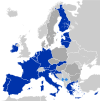Columbia
Columbian Union
|
||||||||||||||||||||||||||||||||||||||||||||||||
|---|---|---|---|---|---|---|---|---|---|---|---|---|---|---|---|---|---|---|---|---|---|---|---|---|---|---|---|---|---|---|---|---|---|---|---|---|---|---|---|---|---|---|---|---|---|---|---|---|
|
||||||||||||||||||||||||||||||||||||||||||||||||
| Motto: "Columbia, March! | ||||||||||||||||||||||||||||||||||||||||||||||||
| Anthem: "Under the Blue and Yellow Flag" | ||||||||||||||||||||||||||||||||||||||||||||||||
| Capital | Duis (de facto) | |||||||||||||||||||||||||||||||||||||||||||||||
| Largest cities | (same as above) | |||||||||||||||||||||||||||||||||||||||||||||||
| Official languages | ||||||||||||||||||||||||||||||||||||||||||||||||
| Demonym | Columbian | |||||||||||||||||||||||||||||||||||||||||||||||
| Type | Supranational state | |||||||||||||||||||||||||||||||||||||||||||||||
| Member states |
|
|||||||||||||||||||||||||||||||||||||||||||||||
| Leaders | ||||||||||||||||||||||||||||||||||||||||||||||||
| - | President of the Council of Columbia | Judia Lykos | ||||||||||||||||||||||||||||||||||||||||||||||
| - | Chancellor of Columbia | Felix Istvan | ||||||||||||||||||||||||||||||||||||||||||||||
| Legislature | - Columbian Council - Parliament |
|||||||||||||||||||||||||||||||||||||||||||||||
| Formation | ||||||||||||||||||||||||||||||||||||||||||||||||
| - | Treaty of Duis | 31 December 1949 | ||||||||||||||||||||||||||||||||||||||||||||||
| - | Treaty of Staufen | 1 January 1971 | ||||||||||||||||||||||||||||||||||||||||||||||
| Area | ||||||||||||||||||||||||||||||||||||||||||||||||
| - | Total | 4,324,782 km2 1,669,808 sq mi |
||||||||||||||||||||||||||||||||||||||||||||||
| - | Water (%) | 3.08 | ||||||||||||||||||||||||||||||||||||||||||||||
| Population | ||||||||||||||||||||||||||||||||||||||||||||||||
| - | 2015 estimate | 524,890,134 (3rd) | ||||||||||||||||||||||||||||||||||||||||||||||
| - | Density | 115.8/km2 300.9/sq mi |
||||||||||||||||||||||||||||||||||||||||||||||
| GDP (PPP) | 2015 estimate | |||||||||||||||||||||||||||||||||||||||||||||||
| - | Total | $23.892 trillion (1sta) | ||||||||||||||||||||||||||||||||||||||||||||||
| - | Per capita | $45,518 (16tha) | ||||||||||||||||||||||||||||||||||||||||||||||
| GDP (nominal) | 2015 estimate | |||||||||||||||||||||||||||||||||||||||||||||||
| - | Total | $20.112 trillion (1sta) | ||||||||||||||||||||||||||||||||||||||||||||||
| - | Per capita | $38,316 (19tha) | ||||||||||||||||||||||||||||||||||||||||||||||
| Gini (2010) | 30.4 medium |
|||||||||||||||||||||||||||||||||||||||||||||||
| HDI (2011) | very high · 10th |
|||||||||||||||||||||||||||||||||||||||||||||||
| Currency |
|
|||||||||||||||||||||||||||||||||||||||||||||||
| Time zone | WET | |||||||||||||||||||||||||||||||||||||||||||||||
| - | Summer (DST) | WEST (UTC+1) CEST (UTC+2) EEST (UTC+3) |
||||||||||||||||||||||||||||||||||||||||||||||
| Internet TLD | .cu | |||||||||||||||||||||||||||||||||||||||||||||||
| Website europa.eu |
||||||||||||||||||||||||||||||||||||||||||||||||
| a. | If considered as a single entity. | |||||||||||||||||||||||||||||||||||||||||||||||
Columbia, officially the Columbian Union (CU) (sometimes referred to as the Columbian Federation) is a supranational federation of 14 member states that are located primarily in Europe. The union is governed by the Council of Columbia, which serves as the executive branch. The Columbian Parliament passes all of the union's laws, and is elected every four years by the citizens of the CU, but is answerable to the Council of Columbia and the Union Commission.
History[edit | edit source]
Pre-1949: Proposal[edit | edit source]
1949-1963: Columbian Community[edit | edit source]
1970s: Staufen Treaty[edit | edit source]
1975-1988: Creation[edit | edit source]
1988-present[edit | edit source]
Culture[edit | edit source]
The culture of Columbia is extremely diverse, featuring over 100 ethnic groups. However, Columbian culture stems from a "common cultural heritage". The source of this common background is largely attributed to Delian antiquity, dating back almost fifty thousand years, and continued to expand during the Enlightenment, the development of Humanism, and the adoption of social democracy.
Columbia is often described as the cradle of Western culture, yielding the original ideas of democracy, humanism, and progressivism, setting it apart from
Religion[edit | edit source]
Religious groups of Abbasid as of 2010.
Article 15 of Columbia's constitution states: "secularism, social equality, equality before law shall be upheld", effectively banning the establishment of an official religion. The citizen population is 41.5% Dodekatheist (including Andalusian folk religion), constituting the largest religious group in Columbia, although the proportion falls to 39.2% when the non-national population is included. Christians make up 24.3%, Atheists/Agnostics 20.0% and Muslims 7.8%.
Polls taken in 2013 show that, of Columbia's population, 72% of those stated that religion played no role in their daily lives at all, 12% said religion played a minor role in their lives, while only 6% stated that religion played an important role in their lives. The remainder either declined to answer, or were unsure. This shows a major change in the Columbian population, with a sharp decrease of those who held religion to a higher priority in their lives.
Dodekatheism is considered the "religion of Columbia" with strong ties to the Columbian identity and promotion of Humanism and tolerance, which are key to Columbian philosophy.
Sport[edit | edit source]
Symbols[edit | edit source]
Karl the Great - Emperor of the Holy Columbian Empire
The Goddess Columbina - The name Columbia is derived from her
Legal system[edit | edit source]
Courts of Justice[edit | edit source]
Human rights[edit | edit source]
As stated in Articles I-1 and I-2, the Union is based on common values, namely:
- human dignity
- freedom
- democracy
- equality
- the rule of law
- respect for human rights
- minority rights
- free market
Columbian states also declare that the following principles prevail in their society:
- pluralism
- non-discrimination
- tolerance
- justice
- solidarity
- equality of the sexes
Economy[edit | edit source]
Currency[edit | edit source]
Monetary union[edit | edit source]
Central Columbian Bank[edit | edit source]
Energy[edit | edit source]
Infrastructure[edit | edit source]
Geography[edit | edit source]
States[edit | edit source]
Enviorment[edit | edit source]
Government and Politics[edit | edit source]
| Columbian Union |
 This article is part of a series on the |
Policies and issues
|






